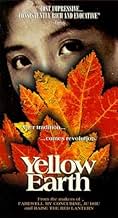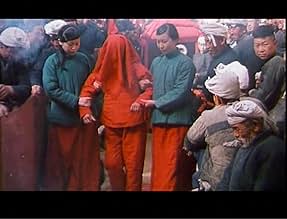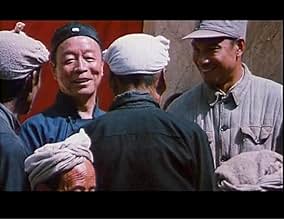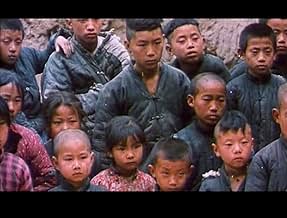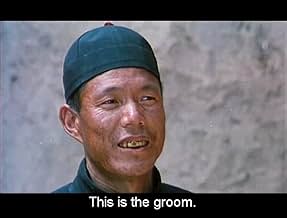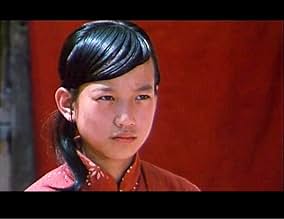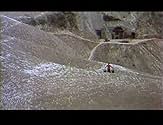IMDb RATING
7.1/10
2.7K
YOUR RATING
A communist soldier travels to Shanbei to collect folk songs for propaganda while visiting a poor peasant family, giving hope to the teenage daughter in escaping an arranged marriage.A communist soldier travels to Shanbei to collect folk songs for propaganda while visiting a poor peasant family, giving hope to the teenage daughter in escaping an arranged marriage.A communist soldier travels to Shanbei to collect folk songs for propaganda while visiting a poor peasant family, giving hope to the teenage daughter in escaping an arranged marriage.
- Awards
- 8 wins & 5 nominations total
- Director
- Writers
- All cast & crew
- Production, box office & more at IMDbPro
Featured reviews
A young slodier from the communist party is sent to northern China to collect some "happy" fols songs for helping the party boost army's morale during the battle against Japanese invasion in 1939 shortly before WW2. There he meets a farmer family- a father and 2 kids- but all songs they know is about endless suffering and pain.
Director Kaige Chen uses this setting to build up a rather interesting encounter between 1. a young soldier full of ideologies and strong beliefs and 2. a poor family in rural north China with extreme living difficulties and hardships. The young soldier believes that sickles and hammers will help these poor people and build them roads but we as viewers know that such things won't happen, we've seen that no ideology will end these circumstances.
The film is believed to be a Chinese communist propaganda vessel but what I gathered from this film was that it shows communism- maybe not directly- as yet another incompetent, useless set of beliefs.
This is not an enjoyable film, nor is it easy to watch. It feels really long for 86 minutes and it desparately needs a restoration. What it does however, is it opens discussions with friends, it makes people think and of course it's a very influential, historically important cinematic piece.
Director Kaige Chen uses this setting to build up a rather interesting encounter between 1. a young soldier full of ideologies and strong beliefs and 2. a poor family in rural north China with extreme living difficulties and hardships. The young soldier believes that sickles and hammers will help these poor people and build them roads but we as viewers know that such things won't happen, we've seen that no ideology will end these circumstances.
The film is believed to be a Chinese communist propaganda vessel but what I gathered from this film was that it shows communism- maybe not directly- as yet another incompetent, useless set of beliefs.
This is not an enjoyable film, nor is it easy to watch. It feels really long for 86 minutes and it desparately needs a restoration. What it does however, is it opens discussions with friends, it makes people think and of course it's a very influential, historically important cinematic piece.
10mdworak
This movie is, to say the very least, a work of art. No other movie has ever evoked such emotional tears from my eyes as Yellow Earth. From the foreshadowing wedding ceremony, to the repetition in Cuigiao's own wedding, from distant silhouettes, to the ominous slow motion running of Hanhan during the ceremonial rain dance at the end, I have never felt the extent of sympathy for characters in a film as I have during and after viewing Yellow Earth. The folk songs reiterated the intensity of the sorrow through their text and solemn melodies. Ch'en Kaige beautifully crafted this film, bringing a little understanding of the plight of traditional China, and the revolutionary attempt to better their situation.
In this handsome but dramatically subdued portrait of life in the harsh, mountainous hinterland of mainland China a plucky young bureaucrat, collecting folk songs for the communist army, befriends a penniless widower and his children, before learning to his horror that the winsome teenage daughter is to be sold against her will into marriage with an elderly local farmer. Director Kaige Chen shows a photographer's eye for visual composition and symmetry, but the narrative structure of his film is almost non-existent. This is storytelling completely uninfluenced by Western techniques and standards, unfolding for the most part through imagery and song. Whether the result is a refreshing change of pace or an exercise in tedium will depend entire on the viewer's attitude toward classic Third World cinema.
10cameroj
My first viewing of this film was in a freshman seminar here at the University of Michigan aptly called "Chinese Cinema." Immediately after the viewing, my professor left the room and the majority of the class let out a syncronized moan. "I believe that was the worst film we've seen this far," he said. Never could he have been more wrong.
After viewing the film again and taking extensive notes for a paper on the film's earth/ sky imagery, I can say in objectivity that Yellow Earth is a landmark of not only Chinese, but Worldwide cinema. To those who would pay close attention, the film is a piece of art that is inexhaustible in its symbolism and technique. The film's cinematographer, the now very famous director Zhang Yimou, gives each frame its proper condition to the story. Every shot is composed with detail and beauty. The story is inextricably steeped in allegory, each character placed remarkably in relation to the others and to the landscape around them. This composition and the wonderful editing make this film a great cinematic achievement.
The key to the movie's wonder, however, is its ambiguities and its ambivalences. All the editing patterns, the quick cuts and the long stretches, and the masterful composition are strands that are woven as the viewer wills them to be. The ways to interpret everything this movies gives us are endless. Speculation on the film is a task never ending. If you can understand this and cherish the wonder that this film creates through its ambivalence, Yellow Earth is a pleasure with few peers. I recommend that every person interested in Chinese Cinema and classics of all foreign cinema watch this at least once.
After viewing the film again and taking extensive notes for a paper on the film's earth/ sky imagery, I can say in objectivity that Yellow Earth is a landmark of not only Chinese, but Worldwide cinema. To those who would pay close attention, the film is a piece of art that is inexhaustible in its symbolism and technique. The film's cinematographer, the now very famous director Zhang Yimou, gives each frame its proper condition to the story. Every shot is composed with detail and beauty. The story is inextricably steeped in allegory, each character placed remarkably in relation to the others and to the landscape around them. This composition and the wonderful editing make this film a great cinematic achievement.
The key to the movie's wonder, however, is its ambiguities and its ambivalences. All the editing patterns, the quick cuts and the long stretches, and the masterful composition are strands that are woven as the viewer wills them to be. The ways to interpret everything this movies gives us are endless. Speculation on the film is a task never ending. If you can understand this and cherish the wonder that this film creates through its ambivalence, Yellow Earth is a pleasure with few peers. I recommend that every person interested in Chinese Cinema and classics of all foreign cinema watch this at least once.
Not far from the yellow river there is a big area where the earth also is yellow and the climate and living are very harsh, this time because of a drought. First we see a wedding ceremony with the bride little more than 12 years old, a happy occasion for everyone except for the skeptical onlooking Cuiqiao whose fate will be similar in short time and the bride herself. Enter folk song collector comrade Gu who stays with her family for some time. His talk of whats going on in the south, the end of arranged weddings and equality of women sets a deep impression on Cuiqiao, but also her mute brother.
Much of the film is told in its folk songs and its pictures. Cuiqiaos misery is told with songs: "of all the people//girls are the most miserable" and her new hope with the songs of the Party.
The pictures leave much room for the environments to sink in. Distances are big and the landscape homogeneous, that is earth covered mountains and a wide yellow river. In a setting such as this, the figures get small, and even more so by the devotion Zhang Yimou gives to the vast sky.
Much of the film is told in its folk songs and its pictures. Cuiqiaos misery is told with songs: "of all the people//girls are the most miserable" and her new hope with the songs of the Party.
The pictures leave much room for the environments to sink in. Distances are big and the landscape homogeneous, that is earth covered mountains and a wide yellow river. In a setting such as this, the figures get small, and even more so by the devotion Zhang Yimou gives to the vast sky.
Did you know
- TriviaThe film was filmed near Yan'An, which is considered the motherland of the Chinese cultural revolution.
- ConnectionsFeatured in The Story of Film: An Odyssey: Fight the Power: Protest in Film (2011)
- How long is Yellow Earth?Powered by Alexa
- Why is this a "classic"?
Details
- Release date
- Country of origin
- Language
- Also known as
- Yellow Earth
- Production company
- See more company credits at IMDbPro
Contribute to this page
Suggest an edit or add missing content


